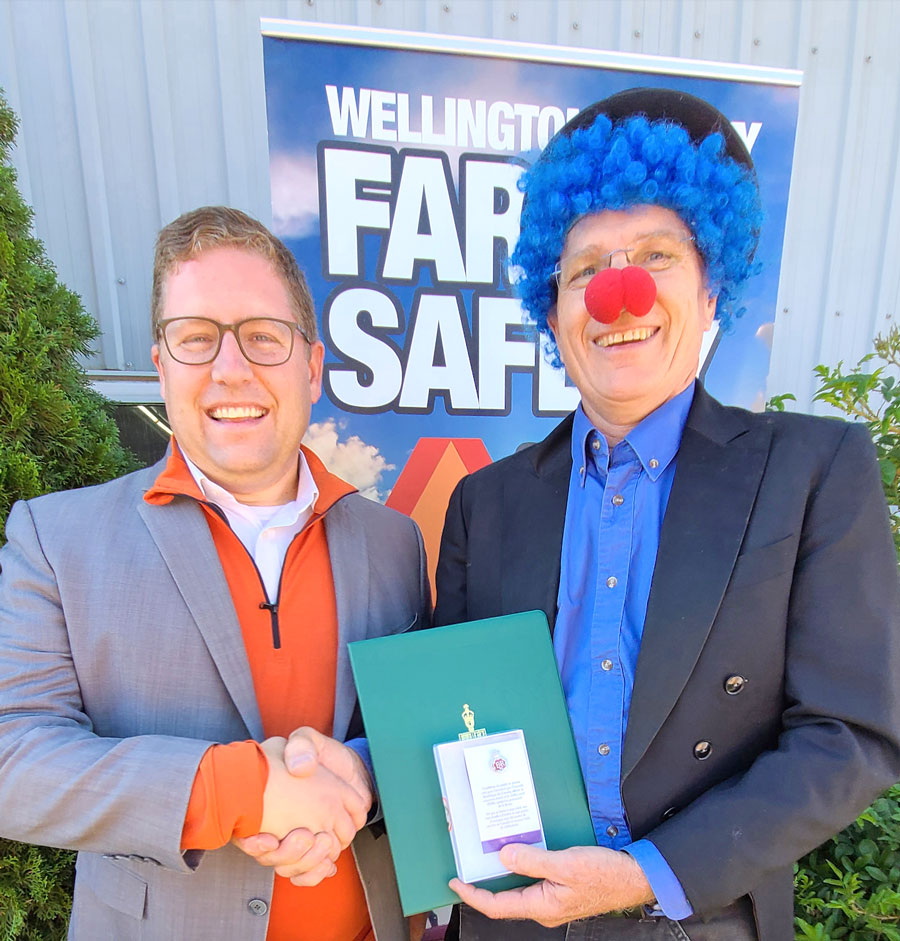WELLINGTON COUNTY – The county is home to a large rural community full of winding sideroads, picturesque barns and silos, and carefully manicured fields that seem to stretch out for miles.
While beautiful, these sites come with underlying dangers – and accidents can happen in the blink of an eye.
No one knows this better than Walter Grose, secretary for the Wellington County Farm and Home Safety Association.
With over 30 years of experience, Grose was awarded the Queen’s Platinum Jubilee medal for his farm safety work in September.
He hosts farm safety talks in Alma, Mount Forest, at the Drayton Farm Show and in other locations.
This year the Canadian Agricultural Safety Association (CASA) is recognizing Canadian Agricultural Safety Week from March 12 to 18. The organization is dedicated to improving the health and safety of farmers, their families and employees.
There are many risks involved with farming and added stresses are making it increasingly difficult for farmers to do their jobs safely.
Fortunately, steps can be taken to minimize those risks and help is available for those who need it.
Mental health
According to the Mental Health Commission of Canada, farming and ranching are considered the two most stressful occupations – both physically and mentally.
This may be surprising to some, but when factoring in issues like financial uncertainty, isolation, and reliance on favourable weather, it’s not difficult to understand.
“We had, what, three or four farmers in Grey County commit suicide last year,” Grose told the Advertiser.
“So people need to understand that it’s a priority. [Depression] is the buzzword for everything, which makes it a little bit too complacent.”
Depression should never be a buzzword and no one, especially those working around the clock to feed our growing population, should ever feel like help isn’t available.
Anyone struggling with suicidal thoughts or mental health issues, can call Talk Suicide Canada at 1-833-456-4566. There are also other local organizations that can help.
Highway safety
Impatience on the roads is a growing concern, especially when it comes to farm vehicles moving slowly down two-lane highways.
Whether late for work or headed up to the cottage for a long weekend, it can be frustrating getting stuck behind a slow moving parade of cars led by an oversized hay wagon.
“If we have a combine on the road – that combine driver knows what he’s doing. He knows how to drive,” Grose said.
“But the 100 cars that pass him every five minutes, they don’t know and they don’t care. They just see this obstruction, and they want to get around.”
While it’s important for farm equipment to have checks in place – slow moving vehicle (SMV) signage, safety chains, proper lighting – it’s also important for all drivers to obey the rules of the road and respect that farmers aren’t there to inconvenience others – they’re doing important work.
“During the wrapping season, we’re out 24 hours a day. So, we’re there at 12 o’clock at night working to try and finish the field before the rain the next day,” Grose said.
Operators of large machinery are trained to avoid high traffic areas whenever possible and to pull over to let other vehicles pass when it is safe to do so. The biggest thing motorists need to be aware of is when it’s safe to pass and exercise patience when it’s not.
Rollovers and runovers
In the agricultural sector, most injuries and deaths in North America are the result of tractor rollovers and runovers according to Grose.
Many of these incidents can be prevented simply by slowing down and knowing the equipment.
“We’ve seen all these accidents happen,” Grose said.
“So that’s the thing we’re trying to teach people – slow down.”
As basic as it sounds, often it’s just things like turning around and using the steps of a tractor, rather than jumping from the top step because it might be faster and has been done safely in the past.
It’s important to always be aware of one’s surroundings and weather conditions, make sure equipment is properly maintained, and to use good judgement when operating a tractor.
The future of farming
Autonomous tractors are a rapidly growing trend in the agricultural industry.
They are designed to operate without the need for a human driver and are equipped with sensors, GPS, and advanced computer systems.
While the technology is still in its early stages, it has the potential to revolutionize farming and increase efficiency while reducing labour costs.
“Autonomous equipment is certainly going to help,” said Grose, who travelled to Denmark last summer and saw demonstrations at universities there.
The unmanned machines drive up and down fields, keeping their position accurate via satellite – and when a person stepped in their path, the sensors would recognize them and stop the machine.
“Definitely, I see autonomous tractors coming – that’s for sure, because we have to do more work with less people because there’s just nobody around to do the work,” Grose added.
“I’m just starting to work with electric tractors now in our factory here. But I haven’t seen anybody here working with autonomous tractors.”
It’s unlikely anyone will see autonomous tractors working the fields of Wellington County this year, but given they can work around the clock without breaks, reducing labour costs and improving safety, they may not be as far off as some people think.
For now, Grose emphasizes slowing down and mitigating risk.
“Everybody jumps, everybody rushes and everybody’s in a hurry, and then they just say ‘Well, it didn’t happen to me last time,’” he said.




